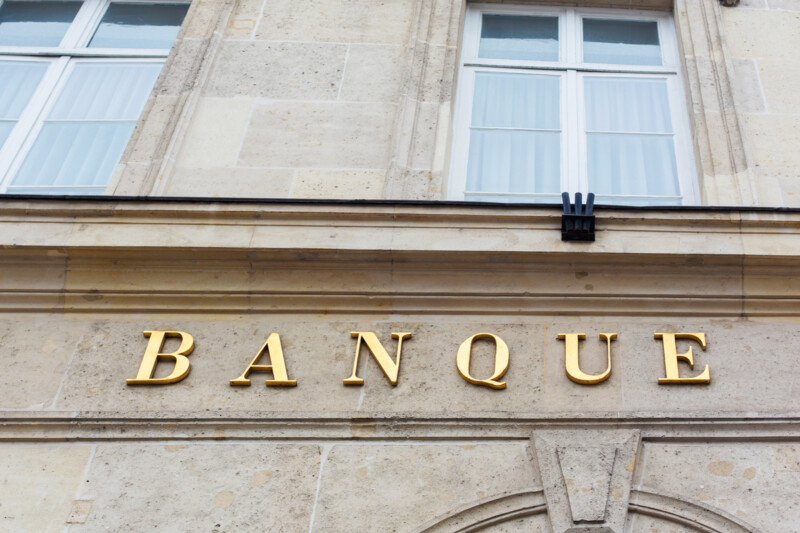Le mois de septembre s’annonce chargé pour les banques, qui doivent faire face à de nombreuses incertitudes. Les filiales russes et italiennes des banques françaises sont confrontées à des crises politiques d’envergure, tandis que l’inflation continue à progresser et que les taux d’intérêt ne cessent d’augmenter. Focus sur les principaux sujets d’actualité du secteur bancaire en cette rentrée 2022.
La hausse des taux d’intérêt du crédit immobilier
Depuis plusieurs mois, les taux d’intérêt du crédit immobilier ne cessent d’augmenter. Alors qu’ils étaient de 1,12 % en janvier, ils s’établissaient à 1,32 % au mois de juin d’après les données de la Banque de France.
Si la production de crédit n’a jusqu’ici pas été affectée par la hausse des taux, les choses risquent de se compliquer à la rentrée. Les banques pointent du doigt le taux d’usure, qui augmente trop lentement par rapport aux taux d’intérêt et risque, selon elles, de bloquer le marché.
Si le ministère de l’Économie et des Finances n’a pour l’instant pas accepté de modifier le mode de calcul du taux d’usure, principale revendication du secteur bancaire, il a tout de même commandé une expertise sur la question.
Les efforts demandés aux banques par Bercy
Pour éviter un éventuel blocage du marché, Bercy attend des banques qu’elles freinent la hausse des taux, estimant que leurs marges sont suffisamment confortables pour le faire.
Une réunion est prévue en septembre avec les représentants des banques et des assurances, que Bercy souhaite convaincre d’abaisser les frais bancaires et les primes d’assurance. L’objectif : préserver le pouvoir d’achat des Français, mis à mal par l’inflation.
De leur côté, les banques redoutent que le gouvernement décide d’imiter la Hongrie ou l’Espagne, où des taxes exceptionnelles sont désormais appliquées à plusieurs secteurs d’activité, dont le secteur bancaire, dans le but de financer des plans d’aide aux ménages.
L’avenir des banques françaises implantées en Russie
Si les banques européennes, et parmi elles les banques françaises, continuent à quitter la Russie, le montant de leur exposition impacte leur politique de rachat d’actions et de dividende.
C’est notamment le cas du groupe bancaire italien Unicredit, qui réduit peu à peu son exposition dans le but de vendre à bon prix, ce qui n’est pour l’heure pas envisageable avec 18 milliards d’euros d’exposition à la fin du deuxième trimestre 2022. Après avoir cédé Rosbank, Société Générale ne conserve plus quant à elle que 3,1 milliards d'euros d'exposition.
Selon l’agence de notation DBRS, le scénario le plus à craindre est celui d’un nouveau choc énergétique : les banques européennes devraient alors faire face à une génération de capital négatif.
Crédit Agricole et la crise politique italienne
Crédit Agricole, qui possède depuis le mois d’avril une participation de 9,18 % dans le capital de la 3ème banque de la Péninsule, Banco BPM, risque de voir ses projets contrariés par la crise politique italienne.
En 2021, Crédit Agricole a acquis la banque lombarde Credito Valtellinese (Creval), et a pour projet d’établir un partenariat avec Banco BPM autour des métiers de l’assurance.
Mais l’Italie, qui est désormais le 2ème marché de Crédit Agricole, est secouée par une crise politique qui pourrait perturber les plans du groupe français. La démission du Premier ministre Mario Draghi et les élections législatives anticipées prévues dans quelques semaines freinent les investisseurs étrangers, qui craignent l’arrivée au pouvoir du parti ultraconservateur Fratelli d'Italia.
Une conjoncture incertaine
Le risque de récession en 2023 plane sur le secteur bancaire, confronté à une conjoncture très incertaine et marquée notamment par le conflit russo-ukrainien, la crise politique italienne, les difficultés d’approvisionnement et l’inflation.
La hausse des taux de la Banque centrale européenne va permettre aux banques d’augmenter leurs marges, mais elles risquent également de devoir faire face à une recrudescence des créances douteuses.
Pour anticiper ces difficultés, il est probable que le Haut conseil de stabilité financière, qui doit se réunir fin septembre, exige des banques une augmentation de leurs fonds propres.
La mutualisation des parcs de distributeurs
L’année dernière, Société Générale, BNP Paribas et Crédit Mutuel avaient annoncé leur volonté de mettre en commun leurs parcs de distributeurs automatiques de billets.
Face à la baisse des retraits d’espèces, la mutualisation des parcs de DAB apparaît comme un moyen de contenir la hausse des coûts d’exploitation tout en conservant un réseau étendu. La phase de cadrage de ce projet de mutualisation doit s’achever à la fin de l’année, pour une mise en place d’ici la fin de l’année prochaine.
Les négociations salariales
Quelques mois seulement après les négociations salariales 2022, de nouvelles discussions avaient été ouvertes dans certains établissements à la demande des syndicats, qui entendent bien convaincre les directions des grandes banques d’aborder de nouveau le sujet dès le mois de septembre.
Les augmentations salariales collectives obtenues en début d’année sont jugées très insuffisantes par les syndicats au regard de la progression de l’inflation. Les augmentations étaient en moyenne comprises entre 0,5 et 1 %, alors que la hausse des prix atteignait en juillet 6,1 % sur un an.
